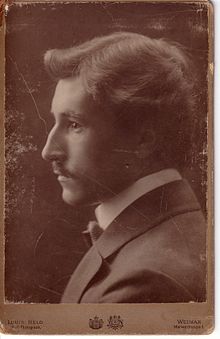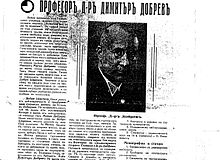- Dimitar Dobrev (academic)
-
Dimitar Dobrev born 31 August 1888 Kotel Bulgaria-died 21 April 1961 Sofia Bulgaria.
Professor Dobrev is one of Bulgaria’s distinguished economists, lecturer in book-keeping and accountancy as science, author of many theoretical works in the field of economics. He studied at Trade and Commerce College Svishtov (1907) and graduated in Germany, completing a doctorate degree in economics at Erlangen 1911.
He was Under-Secretary to Trade and Commerce Chambers and later a High School Teacher in Plovdiv (1911-1918). He worked at Bulgarian Central Cooperative Bank, Sofia (1918-1919), followed by a teaching post in trade and commerce high school, Sofia (1919-1924).
Contents
Contributions to Bulgarian Economic, social and administrative sciences
He taught as a regular professor (1924-1940) at Sofia University “Kliment Ochridski” where he conducted research at the State Higher Education School of Finance and Administrative Sciences at which he became second Rector (1940 to 1948) succeeding Professor Stefan Bobchev. From the inception of the former Higher Institute of Economics “Karl Marx” Professor Dobrev was a longstanding lecturer. He is listed at the University of National and World Economy founded in 1920. He continued as First Dean and Professor in the Faculty for economic and social sciences at Sofia University (1947 to 1959).
Prof. Dobrev is mentioned by his former students (e.g.Professor Christo Kaligorov) as ″not merely a great scientist, but an educator and a pedagogue″.[1] [2]
Professor Kosta Pergelov spoke of his ″contribution as the founder of contemporary accountancy theory in Bulgaria, who is rightly regarded by the generations as the patriarch of accountancy in Bulgaria″.[3] [4]. In his academic work, „Strategic accountancy analysis of value-revolutionary stage in the development of accountancy science“ Volume I, 2004,p.33, Docent Trifon Trifonov, cites that “according to D.Dobrev, “...valued categories separately do not accomplish evaluated movements (economic turnover), except for their being placed in one unified functional entirety...it is necessary for these forces to be drawn from their concrete material characteristic over one common denominator of the monetary-valuation enumeration” (as cited in Dobrev, D., Science of the separate economy, Printing House H.G.Danov, O.O.Society, Sofia, 1941, p.108)”[5]. Furthermore (ibid.) Docent Trifon Trifonov cites a colleague,(Yanakiev, R. 1971) where he states, “that when he makes a general historical review of evolution in world theory on business management relative to development in our country during the period 1900-1944, the author especially emphasizes the role of the founder of the Bulgarian Accountancy Science Professor D.Dobrev in the development of this theory.” [6] R.Yanakiev justifiably stresses the contribution of the great Bulgarian economist in developing the ″financial-economic questions″ in management, although reference here is to an entire financial-accounting school for his successors, created by the notable scientist, quite undeservedly forgotten during Bulgaria's totalitarian government. The remarkable work ″Science of the separate economy″ (1941) of Prof.D.Dobrev is marked also in the neoclassical interpretation of capitalist enterprise even by the pre-war Bulgarian political economists. Professor D.Dobrev knew only too well the neoclassical economics (marginalised school) and its European proponents, widely cited in his study of the separate economy. Approaching historically towards understanding of the separate enterprise, the author gives a systematic review of it as an ″instrumental unit, a constructive social element of organised human purposeful activities, at the base of which lies budget activity″ [7] [8] He is reputed to have been an accountant to Tzar Boris III of Bulgaria prior to WW2. He had been a founder and director of the former Institute of Chartered Accountants. He was awarded the Medal of “St.Cyril and Methodius” Ist degree.
Main theoretical works
- “Theory and analysis of balances” Sofia (3 editions to 1946);
- “Science of the separate economy” Sofia (2 editions 1941, 1946);
- “Systematic Course in Accountancy” Sofia (6 editions 1928-1946);
- “Manual for control, revisions and expertise in state enterprises” Sofia (1933);
- “Economics of company enterprises” (1949);
- “Basic analysis of economic activity of industrial enterprises”(2 editions 1954-1957);
- “Systematic accountancy in Trade and Industry” Plovdiv (1914);
- “Structural problems of the automated agricultural industry” (1945);
- “Chartered Accountancy in Industry” (2 editions by 1935);
References
- ^ Bulgarian: в.″Икономист″ Професор д-р Христо Калигоров, ″100 години от рождението на Проф.Димитър Добрев″ бр.20, 23.12.1988 София
- ^ "Economist" Professor Dr Christo Kaligorov, ″100 years of the birth of Professor Dimitar Dobrev″ issue20, 23.12.1988 Sofia
- ^ Bulgarian: Професор Коста Пергелов, ″за счетоводството и счетоводната наука и образование″ http://www.unwe.acad.bg/yearbook/2005/18.pdf стр.212, София
- ^ Professor Kosta Pergelov, ″About accountancy and the science of accounting and education″ http://www.unwe.acad.bg/yearbook/2005/18.pdf page 212, Sofia
- ^ Bulgarian: доц.д-р Трифон Трифонов, ‘Стратегическия счетоводен анализ на стойността-революционен етап в развитието на счетоводната наука’ Научни Трудове Том I, 2004, стр.33http://www.unwe.acad.bg/research/?id=502
- ^ Yanakiev,R.et al,‘Textbook on common theory of socialist management’ part I, publisher ‘Science and Art’, Sofia, 1971, p.48
- ^ „Docent Dr Trifon Trifonov, Strategic accountancy analysis of value-revolutionary stage in the development of accountancy science“ Volume I, 2004,pp.45-47,
- ^ Bulgarian: доц.д-р Трифон Трифонов, ‘Стратегическия счетоводен анализ на стойността-революционен етап в развитието на счетоводната наука’ Научни Трудове Том I, 2004, стр.45-47http://www.unwe.acad.bg/research/?id=502
External links
Categories:- 1888 births
- 1961 deaths
- People from Kotel
- Bulgarian economists
Wikimedia Foundation. 2010.




